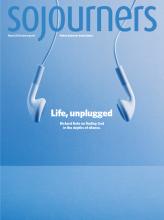BETWEEN 2008 and 2009, the Centers for Disease Control reported in November, the U.S. abortion rate fell 5 percent, down to the lowest point that decade. This new data is drawing the attention of people of faith whose thinking about unwanted pregnancies has become more nuanced—both in how to prevent them and what to do when they occur.
Why did the rate drop? It's not a matter of people being more cautious about becoming pregnant due to the recession; along with the overall decline, the number of abortions per 1,000 live births also dropped. But it might be linked to the fact that use of long-acting contraceptives such as IUDs, which tend to be more effective than other methods, more than doubled from 2007 to 2009, according to a national survey.
In recent years, as evangelical activism has broadened, economic justice, creation care, and immigration reform have been at the forefront of the change—but abortion hasn't. Of evangelicals, 61 percent believe abortion should be illegal in all or most cases, while 33 percent say it should be legal; 84 percent of evangelicals ages 18 to 30 say they would not consider abortion if faced with an unexpected pregnancy.
While 77 percent of those young evangelicals find premarital sex unacceptable, they are also aware of facts on the ground, perhaps because they think seriously about human fallenness. Eighty-two percent, perhaps with the awareness that more-effective birth control would reduce abortion rates further, hold that those having "sex outside of marriage should use contraceptives to prevent pregnancy." (An increasing number of Catholics hold similar views, despite current church teaching.)
Read the Full Article
